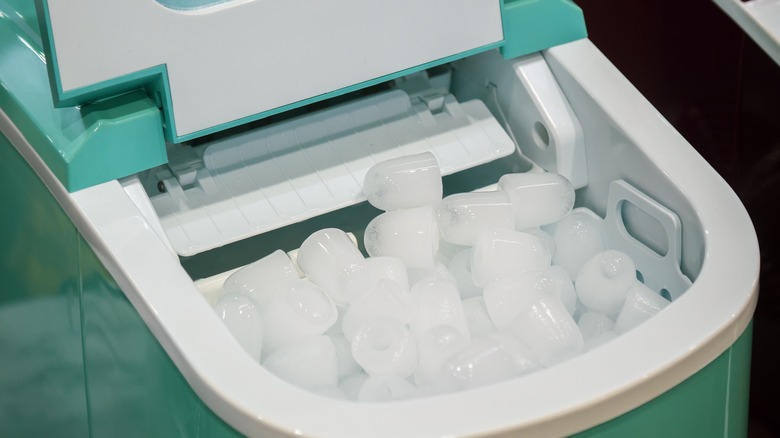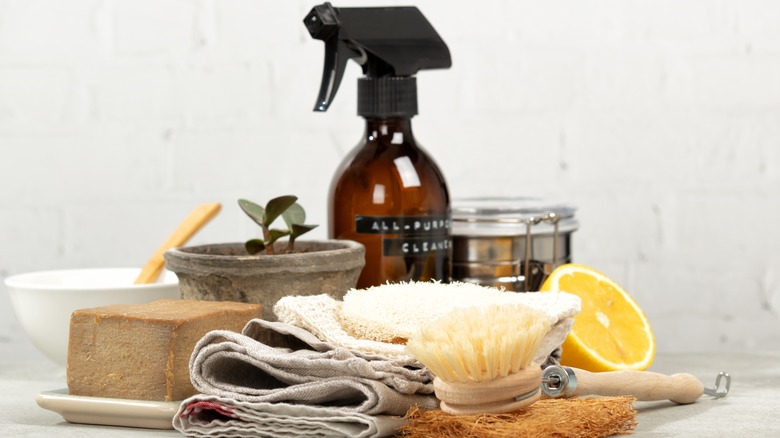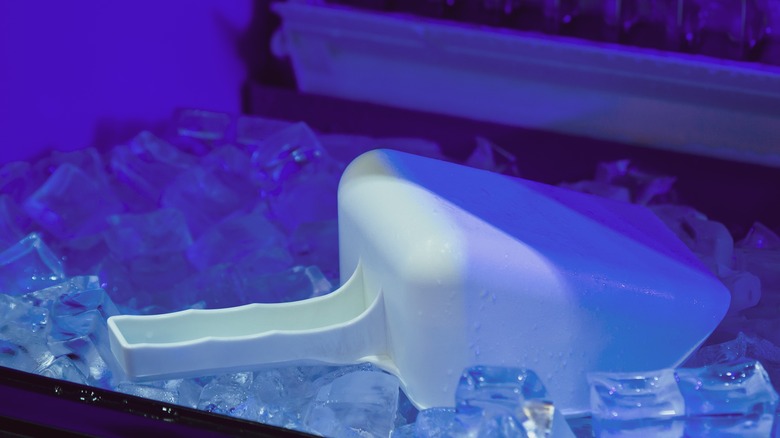The Best Way To Keep Your Countertop Ice Maker Squeaky Clean
Countertop ice makers are compact appliances designed to produce ice quickly and conveniently. But like any food and beverage appliance, these handy machines should be regularly cleaned, not least because they can harbor illness-causing bacteria that can seep into your ice and contaminate your beverages.
Although they are easy to use, countertop ice machines have many nooks and crannies, so thorough cleaning around four times a year is important. Using the right cleaning tools is crucial for effectively removing dirt, debris, and bacteria that may have accumulated over time. Microfiber rags are adept at removing tiny bits of debris with their nanosized fibers, so are great tools for cleaning countertop ice machines. Coarse but not scratchy sponges with high scrubbing power can remove stubborn residue left behind from the microfiber towel. To get those tiny, hard-to-reach corners, a toothbrush can do the trick. However, you can't rely on fabrics alone to clean your countertop ice machine. Dish soap and warm water are a good bet as the detergent cuts through grease and grime. Similarly, vinegar is a natural disinfectant and odor eliminator and handy for this job — it's one of many vinegar hacks that you may wish you knew sooner.
To get cleaning, soak any removable parts of the ice machine in warm, soapy water for at least half an hour while cleaning the interior with a water-vinegar solution. Rotate between sponge, microfiber cloth, and toothbrush depending on the section you're cleaning and the stubbornness of the debris.
Natural versus chemical cleaning supplies
If you're using your countertop ice machine to make ice for drinks, there is some value to using natural cleaning supplies over their chemical counterparts. Some household chemical cleaners are made with volatile organic compounds (VOCs), which can irritate the respiratory system, cause headaches and nausea, and damage the central nervous system. Using naturally derived cleaning products can eliminate exposure to VOCs and other non-potable chemicals while reducing adverse health reactions if accidentally consumed.
In addition to vinegar, other natural cleaners include lemon and baking soda. Lemon can deodorize, brighten, and eliminate bacteria when combined with dish soap, water, or vinegar. Similarly, a baking soda and water mixture can remove tough stains, grime, and funk. Instead of using chemical dish soap, opt for a non-toxic dish cleaner made from castile soap and plant oils.
If you are using cleaners not derived from natural sources, ensure that you are washing the countertop ice machine in a well-ventilated space and that your cleaning solutions have been diluted with water. Thoroughly wipe down the machine and ensure that all of the cleaning solution has dried before you make new ice to prevent cleaning chemicals from entering your drink.
Knowing when to replace a countertop ice machine
Countertop ice makers can last years and with regular cleanings, you can extend their lifespan. But because they are tools designed for making something you consume, it's important to know when to replace your countertop ice machine to avoid making contaminated or tainted ice.
Although consuming small amounts of rust is likely not harmful to your health, rusty ice is a culinary faux pas. If you notice that rust is accumulating in your countertop ice machine in large patches, it might be time to replace it. Although it sounds elementary, if the machine is riddled with mold and mildew, you should also get rid of it. A murky, dusty taste on your ice that isn't improved by semi-frequent cleaning is another telltale sign that it's time to get a new countertop ice machine.
Whether you're making ice to chill a classic margarita, enjoy a delicious iced coffee, or are shaving it down for summertime snowcones, keeping your countertop ice machine clean is important for preserving the integrity and freshness of your ice. After all, clean drinking is happy drinking.


